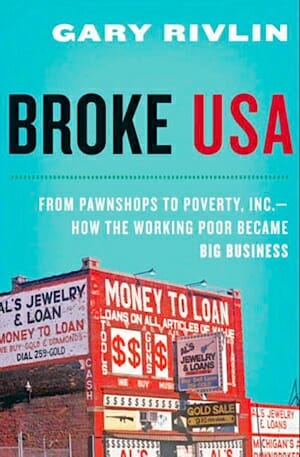Broke, USA: From Pawnshops to Poverty, Inc. – How the Working Poor Became Big Business by Gary Rivlin

If you’ve never used one, you probably don’t think about check-cashing services very much. But if you’re one of the 17 million Americans without a bank account, you could well spend seven hundred dollars a year getting access to your own money, not counting a few hundred more to turn it back into checks to pay bills. Those are sobering numbers, especially if the reason you don’t have a bank account is that you make less than $20,000 a year, and you can’t afford one.
Broke, USA is the story of the poverty industry, the network of subprime mortgage brokers, pawnbrokers, and payday lenders who keep poor Americans poor by charging exorbitant fees and usurious interest rates for services their customers otherwise wouldn’t have at all. People living paycheck to paycheck may pay monthly fees to carry credit cards with interest of 29 percent. They may buy appliances and furniture through a rent-to-own store, making small payments that add up over time to two or three times what the items are worth. They may sell their future tax refunds at a steep discount, like Esau begging for a mess of pottage. They may pawn their guitars, their jewelry, or the titles to their cars.
Or they may, in effect, pawn their next paychecks. Rivlin says, “Payday lending was a late entry in the Poverty, Inc. phenomenon—the first payday lender didn’t go public until 2004—but it is at once more pervasive than any of its scruffy, low-rent cousins and far more controversial.” Broke, USA shows us what the controversy is made of, visiting the Las Vegas trade show of FiSCA, the Financial Service Centers of America, “a rebranding at once more respectable and opaque.”
One of the stars of the book is W. Allen Jones, Jr., of Cleveland, Tennessee, who in 16 years made several hundred million dollars out of $200 one-week loans, issued through some 1,300 Check Into Cash stores. Jones has a compulsion to defend his business against consumer advocates and attorneys general. He feels they conspire to deprive him of an honest living. He bursts with pride over the jobs he’s created, and the help he’s given desperate people who have nowhere else to turn.
Rivlin shows us the opponents, too, like those who fought a 2008 pro-payday referendum in Ohio with the slogan, “Is 391 Percent Too High?” North Carolina’s Center for Responsible Lending was only a small player in that fight, but its founder, Martin Eakes, had long been involved in campaigns to regulate subprime mortgages, which ravaged the lives and finances of the working poor for years before spreading up the economic scale over the past decade. Eakes is another unforgettable character, an idealistic philosophy major turned lawyer and “a virtuoso workaholic—a man who approaches the job as if it were an extreme sport.”
The realities of subprime mortgage demand that kind of energy. Rivlin tells heartrending stories of people in Atlanta who lost houses they owned because they needed to fix a leaky roof. He says, “There was something unmistakably predatory about this earliest iteration of the subprime story. Solicitations for easy money came in the mail and over the phone and sometimes with a knock on the door by a home repair huckster working in tandem with a mortgage broker.”
More disturbing still, these small-time crooks had big-money backers. In 1991, public interest lawyers in Atlanta charged that Fleet Finance, a subsidiary of Rhode Island-based Fleet Bank, had been using pass-through companies to write loans with interest rates over 23 percent, with predictable results: “In 1991, Fleet foreclosed on the homes of nearly 13 percent of the residents with whom it did business in Atlanta and its suburbs.”